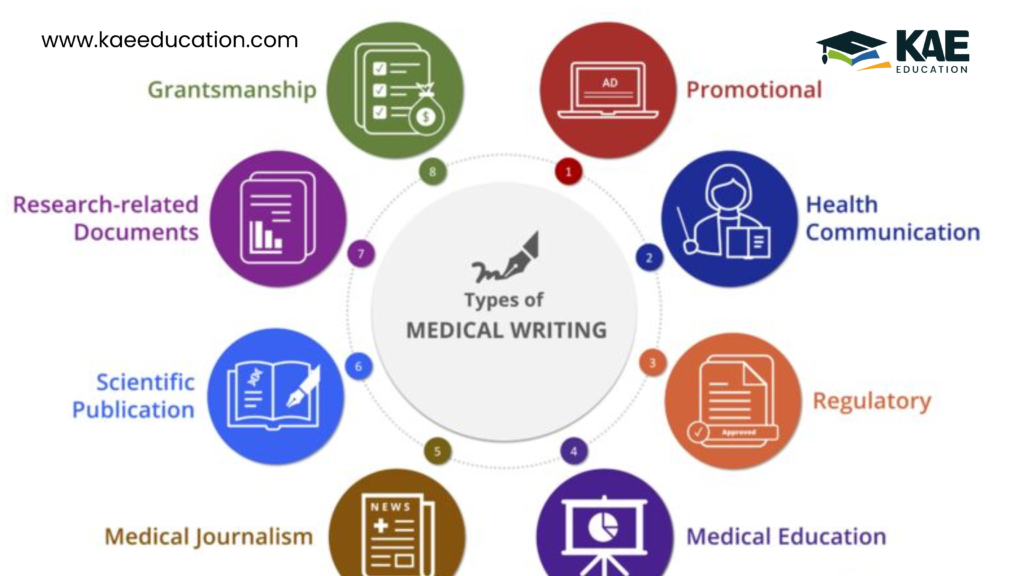Is Medical Writing Right for You? Common Queries and Expert Answers
Medical writing has become a high-demand career within Healthcare and Pharmaceutical Industries, as accurate and clear communication is crucial for research, regulatory compliance, and patient care. But what does it take to thrive as a Medical writer, and is this field the right fit for you? This guide answers the most common questions to help you explore whether Medical writing aligns with your career aspirations.
Understanding Medical Writing
Medical writing involves producing scientific documentation related to healthcare, including regulatory documents, clinical research papers, patient information leaflets, and medical textbooks. Medical writers are responsible for conveying complex information in a way that is clear, accurate, and useful for their intended audience. With the right training, like KAE Education’s Post Graduate Program in Medical Writing, professionals can acquire the technical skills needed to excel in this field.
Key Benefits of a Career in Medical Writing
(i) High Demand in the Healthcare Industry:-
With the growth in clinical research and Healthcare innovation, there is a constant need for well-qualified medical writers.
(ii) Diverse Career Opportunities:-
Medical writers can specialize in areas like regulatory writing, clinical research, or medical journalism, catering to different career preferences.
(iii) Work Flexibility:-
Many Medical writers work remotely or on a freelance basis, offering flexibility in work-life balance.
(iv) Impactful Work:-
Medical writers play a key role in making complex healthcare information accessible, which can benefit both healthcare professionals and patients.
Common Questions and Expert Answers
- What qualifications are required to start a career in medical writing?
A strong foundation in life sciences, pharmacy, or medicine can be beneficial, but it’s not always essential. Key skills include excellent written communication, attention to detail, and the ability to interpret complex data. KAE Education’s Medical Writing course provides the necessary skills, making it suitable for those without a scientific background.
- What types of documents will I learn to create in a Medical writing program?
In a program like KAE Education’s, students learn to create various documents, such as clinical study reports, regulatory submissions, patient information leaflets, and manuscripts for scientific journals. These skills open doors to roles in regulatory writing, scientific writing, and Medical communications.
- How does KAE Education’s Medical Writing course prepare me for real-world roles?
The course includes interactive sessions, case studies, and real-world projects, offering hands-on experience in creating professional medical documents. This practical approach helps bridge the gap between academic knowledge and industry needs.
- What kind of job opportunities are available for Medical writers?
Medical writers can find positions such as Clinical Writer, Regulatory Writer, Scientific Writer, Medical Communications Specialist, and more. These roles are available in Pharmaceutical companies, Medical research organizations, Healthcare agencies, and more.

- How important are certifications in the Medical writing field?
Certifications add credibility and can enhance job prospects. KAE Education’s Medical Writing program prepares students to qualify for respected certifications, ensuring they are competitive in the job market.
- Can I specialize in a particular area within Medical writing?
Yes, Medical writing offers numerous specialties, such as regulatory writing, which focuses on documents for regulatory authorities, or scientific writing, which centers on journal publications. KAE Education’s program provides a solid foundation, allowing graduates to pursue their preferred niche.
- Is remote work common in medical writing?
Yes, many Medical writing positions offer remote work options, which is a significant benefit for those seeking flexibility. Freelancing opportunities are also prevalent, allowing medical writers to work independently or with various clients.
Choosing the Right Training Program
The right education and training can be transformative for anyone considering a career in medical writing. A comprehensive program like KAE Education’s Medical Writing course covers all essential skills, from understanding medical terminology to mastering regulatory writing and research techniques. Additionally, the course offers job placement assistance and preparation for industry-recognized certifications, enhancing your employment prospects.
Conclusion
Medical writing is a fulfilling and lucrative career that combines healthcare knowledge with writing expertise. For those passionate about making medical information accessible, it’s an ideal choice. Whether you’re transitioning from another field or starting fresh, a well-rounded program like KAE Education’s can equip you with the skills, certification, and confidence to succeed. Explore the possibilities in medical writing today and take the first step towards a career that makes an impact.
Medical Copywriting is a dynamic career that opens doors to impactful work. Explore KAE Education’s Post Graduate Program and start your journey today!
Frequently Asked Questions
Not strictly. A scientific background is helpful, but training programs like KAE Education’s are designed to cover essential knowledge for all backgrounds.
With a dedicated program, it’s possible to acquire job-ready skills in a few months. Hands-on experience will further develop your proficiency.
Common tools include Microsoft Word, EndNote, and data analysis software. KAE Education’s course provides training in industry-standard tools.
Salaries vary by location and expertise but tend to be competitive. Specialized roles like regulatory writing often command higher salaries.
Complex data interpretation, tight deadlines, and regulatory requirements can be challenging, but proper training helps in managing these demands.
Absolutely. Many professionals from diverse fields transition into Medical Copywriting. A structured program will ease the learning curve.
Yes, the program provides job placement assistance and prepares you for certification, helping you enter the workforce confidently.

